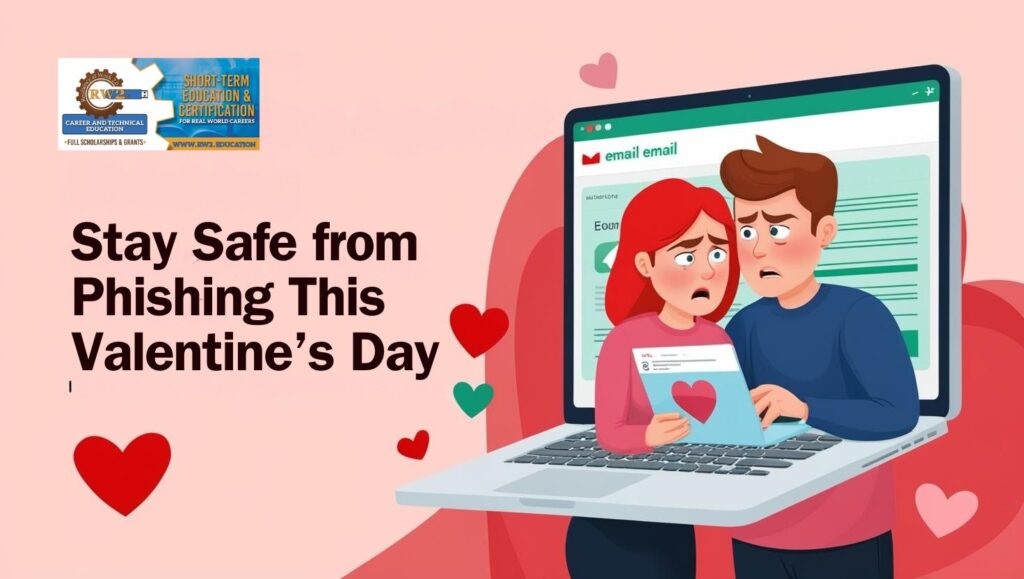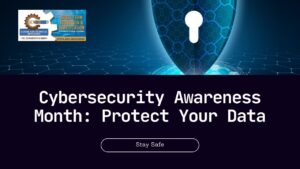
Valentine’s Day is a time to celebrate love and affection, but it’s also a period when cybercriminals intensify their efforts to exploit unsuspecting individuals through phishing scams.
These malicious actors craft deceptive messages, fake e-cards, and fraudulent offers to trick even the most tech-savvy users into revealing personal information or compromising their security.
As students and aspiring professionals, it’s crucial to stay vigilant and informed about these threats to protect yourself and your loved ones.
Understanding Valentine’s Day Phishing Scams
Phishing scams are fraudulent attempts to obtain sensitive information by disguising as trustworthy entities.
During Valentine’s Day, these scams often take advantage of the emotions associated with the occasion. Cybercriminals may send emails or messages that appear to be from secret admirers, popular retailers, or e-card services.
These communications often contain links or attachments that, when clicked, can lead to malware infections or prompt users to enter personal information on fake websites.
Common Valentine’s Day Phishing Tactics
Fake E-Cards
You might receive an email claiming someone sent you a Valentine’s Day e-card. The email urges you to click a link to view the card, but instead, it directs you to a malicious site or downloads malware onto your device.
Too-Good-To-Be-True Offers
Be cautious of emails or ads promoting extravagant discounts on popular Valentine’s gifts like jewelry, chocolates, or flowers. These offers often lead to counterfeit websites designed to steal your payment information.
Romance Scams
Scammers create fake profiles on dating apps or social media platforms, building a relationship with victims to gain their trust. Once trust is established, they fabricate stories to solicit money or personal information.
Delivery Scams
You might receive messages claiming there’s an issue with a package delivery, prompting you to click a link or provide personal details. These are often ploys to harvest your information or install malware.
Tips to Protect Yourself
- Verify the Sender: Always check the sender’s email address or phone number. Be cautious of slight misspellings or unfamiliar domains that mimic legitimate organizations.
- Hover Over Links: Before clicking, hover your cursor over links to see the actual URL. If it looks suspicious or doesn’t match the purported sender, don’t click.
- Be Skeptical of Urgency: Scammers often create a sense of urgency to prompt quick action. Messages pressuring you to act immediately should raise red flags.
- Use Security Software: Ensure your devices have updated security software to detect and prevent malware infections.
- Educate Yourself: Stay informed about the latest phishing tactics.
RW2 Cybersecurity Program: Empowering the Next Generation
For students and aspiring professionals interested in combating cyber threats, the RW2 Cybersecurity Program offers a comprehensive curriculum designed to equip learners with the necessary skills and knowledge to excel in the cybersecurity field.
With a focus on hands-on learning and real-world applications, this program covers a wide range of instructional areas to ensure students have a well-rounded education.
Program Highlights
- Comprehensive Curriculum: The program consists of 24 units that cover everything from the basics of Python programming to advanced topics like network security and threat analysis.
- Hands-On Learning: Students engage in practical exercises, developing security tools, conducting security assessments, and responding to cybersecurity incidents.
- Certification Preparation: The program prepares students for the Security+ exam, a valuable certification for entry-level cybersecurity positions.
- Flexible Learning Options: Evening classes are offered online, accommodating various schedules and allowing learners to balance their studies with other commitments.
By enrolling in the RW2 Cybersecurity Program, students not only gain technical expertise but also develop critical thinking and problem-solving skills essential for a successful career in cybersecurity.
Celebrate Safely: Free Valentine’s Day Card Graphics
To help you celebrate love securely, we’re offering free Valentine’s Day card graphics that you can send to your loved ones. These designs are not only charming but also serve as a reminder of the importance of cybersecurity.
Feel free to download and share these cards—no strings attached, just love and cybersecurity awareness!



This Valentine’s Day, while you share love and affection, remain vigilant against potential phishing scams. By staying informed and cautious, you can protect yourself and your loved ones from cyber threats.
For those passionate about making the digital world safer, consider exploring educational opportunities like the RW2 Cybersecurity Program to equip yourself with the skills needed to combat these challenges.
If you’re interested in enrolling in the Cybersecurity program, click below—exciting news is on the way, and you won’t want to miss it!
Key Takeaways
Stay safe this Valentine’s Day by practicing good cybersecurity habits. If you’re interested in pursuing a career in cybersecurity, learn more about the RW2 Cybersecurity Program and take the first step towards making a difference in the digital world.
Questions? Call us at 816-875-0111
Email us at: rw2.cte@rw2.education
Remember, protecting yourself online is an act of love towards yourself and those you care about.



